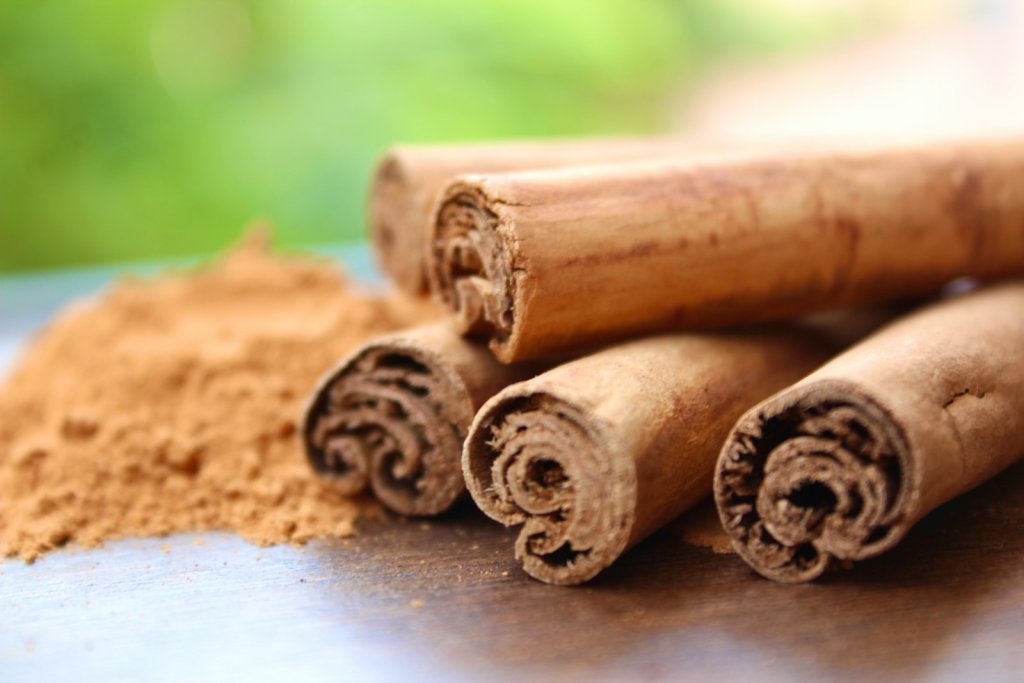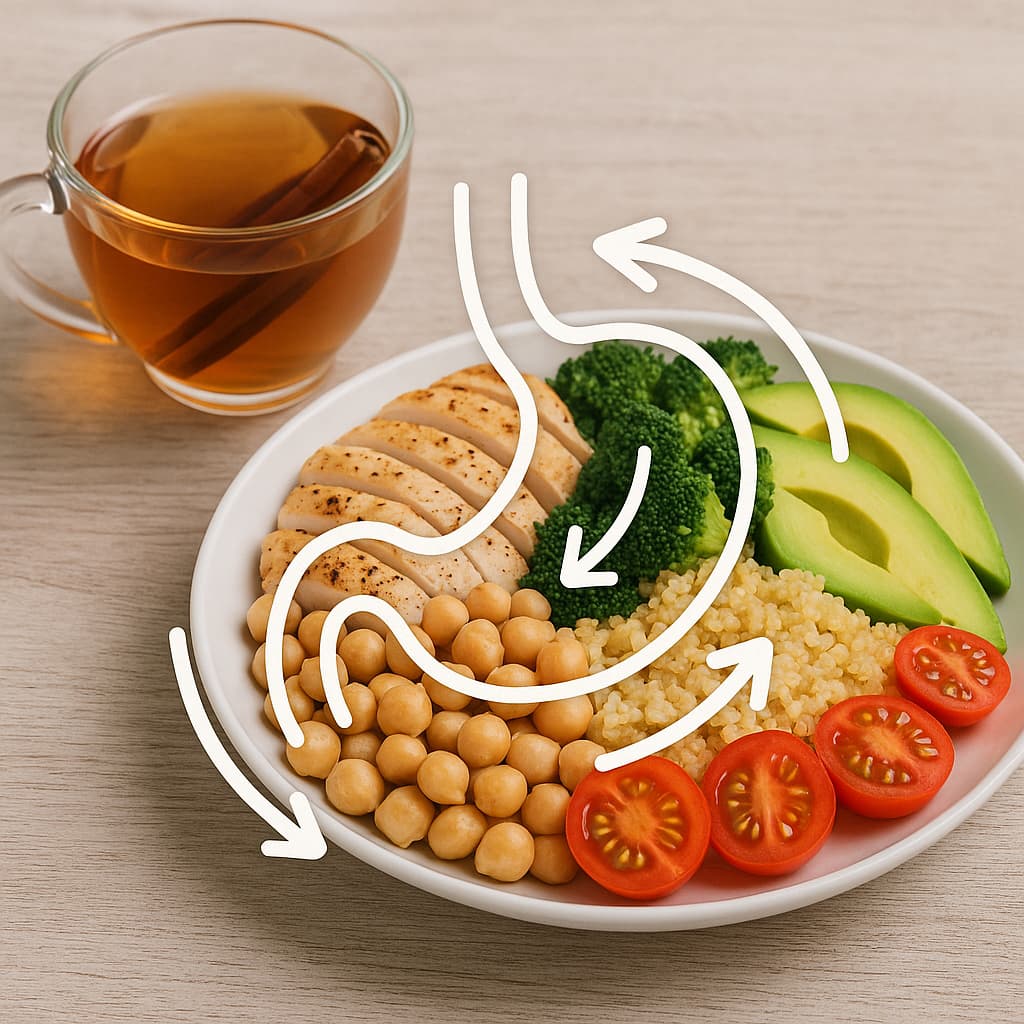Cinnamon tea is more than a comforting, aromatic drink — it’s a powerhouse of antioxidants, anti-inflammatory compounds, and natural blood sugar regulators backed by modern science.
Regularly drinking cinnamon tea may help boost your heart health, balance blood sugar, support digestion, and strengthen immunity, making it one of the most beneficial herbal beverages in your kitchen.

Understanding the benefits of cinnamon tea is important because this ancient spice — revered in Ayurveda, Chinese medicine, and modern nutrition — offers evidence-based wellness advantages with every sip.
It’s naturally caffeine-free, soothing to the stomach, and easy to prepare at home with just a cinnamon stick and hot water.
In this complete guide, you’ll discover:
- The 10 science-backed health benefits of cinnamon tea
- Its nutritional profile and key bioactive compounds
- The best ways to brew and enjoy it naturally
- Recommended daily intake, safety, and potential side effects
Whether you’re looking to reduce sugar cravings, calm inflammation, or simply enjoy a warming ritual that supports whole-body health — this article will show you exactly how cinnamon tea can transform your daily wellness routine.
🍵 Let’s dive into the proven health benefits of cinnamon tea — and why one cup a day can make a real difference.
What Is Cinnamon Tea?
Cinnamon tea is a naturally caffeine-free herbal infusion made by steeping cinnamon sticks or ground cinnamon in hot water. The tea is valued in Ayurveda, Traditional Chinese Medicine, and modern nutrition for its warming, soothing, and health-promoting properties.
There are two main varieties:
- Ceylon cinnamon (Cinnamomum verum): Known as “true cinnamon,” it’s lighter, milder, and lower in coumarin (a compound that may cause liver harm in high doses).
- Cassia cinnamon (Cinnamomum cassia): More common and stronger in flavor but higher in coumarin.
✅ Tip: Choose Ceylon cinnamon when possible — it’s safer for regular use.

Nutritional Profile of Cinnamon Tea
Cinnamon tea isn’t just fragrant — it’s rich in unique bioactive compounds that deliver powerful health benefits. While the tea itself is low in calories, sugar, and fat, its real strength lies in its phytochemicals — plant-based compounds with strong antioxidant and anti-inflammatory properties.
According to Healthline and the U.S. Department of Agriculture (USDA), cinnamon is one of the most nutrient-dense spices in terms of antioxidant content. Even small amounts in tea form can provide measurable wellness effects.
Key Compounds Found in Cinnamon Tea
| Compound | Type | Health Function | Scientific Insight |
|---|---|---|---|
| Cinnamaldehyde | Aromatic aldehyde | Gives cinnamon its flavor and scent; acts as a potent anti-inflammatory and antimicrobial agent | Linked to reduced blood sugar and improved circulation in studies published on PubMed Central |
| Cinnamic Acid | Organic acid | Functions as an antioxidant that neutralizes free radicals and may protect against oxidative stress | Found to lower lipid peroxidation levels in lab research |
| Eugenol | Natural phenol | Offers pain-relieving and antibacterial properties; also used in natural dentistry | Reported by Verywell Health to support oral and gum health |
| Polyphenols | Antioxidant group | Protect cells from oxidative damage and support heart, brain, and immune health | NIH data show cinnamon’s polyphenol content rivals blueberries and green tea |
| Coumarin (trace compound) | Natural compound | Present in cassia cinnamon; may pose liver toxicity in high amounts | NCCIH recommends limiting cassia and choosing Ceylon cinnamon for daily use |
Nutritional Snapshot (Per 1 Cup / 240 ml Cinnamon Tea)
(Values approximate; steeped from 1 stick of Ceylon cinnamon)
| Nutrient | Amount | Daily Value (%DV) |
|---|---|---|
| Calories | 5–10 kcal | <1% |
| Carbohydrates | 2 g | <1% |
| Fiber | 1 g | 4% |
| Manganese | 0.1 mg | 5% |
| Polyphenols | — | High antioxidant activity |
| Caffeine | 0 mg | — |
Why Cinnamon Tea Matters for Your Health
Cinnamon tea contains powerful bioactive compounds such as cinnamaldehyde, cinnamic acid, and polyphenols.
These compounds have been shown to:
- Reduce oxidative stress
- Fight inflammation
- Improve insulin sensitivity
- Support cardiovascular and digestive health
That’s why cinnamon tea has become a go-to wellness drink for those seeking natural ways to improve metabolism, manage blood sugar, and enhance overall well-being.
10 Science-Backed Health Benefits of Cinnamon Tea
When you sip cinnamon tea, you’re not just enjoying a fragrant drink — you’re nourishing your body with one of nature’s most powerful medicinal spices. Modern research supports what ancient healers have long believed: cinnamon tea can strengthen your body from the inside out by fighting inflammation, stabilizing blood sugar, and protecting your heart and brain.
Here are the top 10 health benefits of cinnamon tea, backed by modern science and authoritative sources.
1. Rich in Antioxidants That Protect Your Cells

Cinnamon tea is packed with potent antioxidants, particularly polyphenols, which help neutralize free radicals — unstable molecules that can damage your cells and accelerate aging.
According to a 2023 report from Healthline, cinnamon ranks among the top antioxidant-rich spices in the world, surpassing even garlic and oregano.
These antioxidants fight oxidative stress, a key driver of heart disease, neurodegenerative disorders, and premature aging. Studies from the National Institutes of Health (NIH) indicate that regular intake of antioxidant-rich beverages like cinnamon tea may reduce inflammation and boost cellular repair.
💡 Tip: Drinking a cup of cinnamon tea daily may help fortify your body’s natural defense system against oxidative damage.
2. Supports Blood Sugar Control

Cinnamon tea is best known for its blood sugar–balancing effects. Research published in the Journal of Medicinal Food (2019) found that cinnamon helps slow the breakdown of carbohydrates and enhances insulin sensitivity, allowing glucose to enter your cells more efficiently.
This effect may help lower fasting blood glucose and reduce post-meal spikes — especially beneficial for those managing prediabetes or type 2 diabetes.
The National Center for Complementary and Integrative Health (NCCIH) notes that while cinnamon isn’t a replacement for medical treatment, it may complement a balanced diet and lifestyle for better metabolic control.
🩸 Best time to drink: Enjoy cinnamon tea after meals to help your body process carbohydrates more efficiently.
3. May Lower Cholesterol and Improve Heart Health

Several studies show that cinnamon may help improve lipid profiles by lowering LDL (“bad”) cholesterol, triglycerides, and total cholesterol while increasing HDL (“good”) cholesterol.
A 2024 WebMD review found that people who regularly consume cinnamon tea may experience better heart and circulatory health, thanks to its anti-inflammatory and antioxidant properties.
Cinnamon may also promote better blood flow by relaxing blood vessels and reducing arterial stiffness, two important factors in preventing heart disease.
Combined with a healthy diet and exercise, this makes cinnamon tea a simple yet powerful ally for long-term cardiovascular wellness.
4. Fights Inflammation Naturally

Cinnamon’s key compound, cinnamaldehyde, has been shown to suppress inflammatory cytokines — chemicals that trigger chronic inflammation in the body.
According to a 2023 NIH study, this compound reduces inflammation by blocking NF-kB, a molecular pathway linked to arthritis, diabetes, and even certain cancers.
Chronic inflammation is considered the root cause of many modern diseases, and adding cinnamon tea to your daily routine can help calm these inflammatory processes naturally.
As Healthline notes, consistent consumption may lead to improved joint comfort and better metabolic function.
5. Aids Digestion and Reduces Bloating

Cinnamon tea is a time-tested digestive tonic used in Ayurveda and traditional medicine for centuries.
It works by stimulating digestive enzymes and reducing gas formation, making it an excellent post-meal beverage.
According to Verywell Health, cinnamon tea helps soothe indigestion, nausea, and bloating, while promoting smoother intestinal movement.
For best results, enjoy a warm cup of cinnamon tea after heavy or greasy meals — it not only aids digestion but also provides a comforting aroma that relaxes the stomach muscles.
6. Helps Reduce Menstrual Pain

Cinnamon tea is a gentle, natural remedy for menstrual cramps and PMS symptoms.
A National Library of Medicine (2023) study found that women who consumed cinnamon tea or supplements experienced less pain, nausea, and fatigue during their menstrual cycles.
This effect is attributed to cinnamon’s anti-inflammatory and muscle-relaxant properties, which help ease uterine contractions.
WebMD also highlights that cinnamon may regulate prostaglandins — hormone-like substances responsible for period pain.
🌸 Tip: Sip warm cinnamon tea with a touch of honey during your period for natural relief and relaxation.
7. Boosts Immunity and Fights Infections

Cinnamon tea’s antimicrobial, antiviral, and antifungal properties make it a natural immunity booster.
Laboratory studies published on PubMed Central show that cinnamon extract inhibits harmful bacteria like E. coli, Listeria, and Staphylococcus aureus.
It’s also shown mild antiviral activity, making it useful during cold and flu seasons.
Drinking cinnamon tea regularly can help strengthen immune defense, reduce infection risk, and soothe sore throats.
Adding lemon and honey enhances its natural antibacterial and anti-inflammatory effects.
8. Supports Weight Management

Cinnamon tea may help manage weight by reducing appetite and controlling blood sugar spikes that lead to cravings.
A 2024 report from Verywell Health noted that regular cinnamon consumption was linked to lower body mass index (BMI) and improved waist circumference in overweight adults.
By improving insulin efficiency and boosting metabolism, cinnamon tea supports your body’s fat-burning processes naturally.
However, experts emphasize it works best when combined with healthy eating and exercise — not as a standalone weight-loss tool.
9. May Improve Brain Health and Focus

Emerging research suggests cinnamon may protect the brain and enhance memory.
According to studies reviewed in the Journal of Neuroimmune Pharmacology, cinnamon compounds increase levels of brain-derived neurotrophic factor (BDNF) — a protein that supports neuron growth and cognitive function.
This effect may help reduce age-related memory decline and protect against neurodegenerative diseases like Alzheimer’s.
Healthline also mentions that cinnamon’s scent alone may improve alertness and focus, making it a great caffeine-free alternative for mental clarity.
10. Promotes Oral and Dental Health

Cinnamon’s antibacterial power extends to your mouth, where it helps fight odor-causing bacteria and gum infections.
According to WebMD, cinnamon oil has strong antibacterial activity against oral pathogens, helping reduce plaque buildup and bad breath.
You can use cooled cinnamon tea as a natural mouth rinse — it freshens breath, reduces bacteria, and promotes gum health without alcohol or harsh chemicals.
For best results, use unsweetened Ceylon cinnamon tea and swish gently for 30 seconds after brushing.
Best Natural Ways to Enjoy Cinnamon Tea

Cinnamon tea is one of the simplest and most comforting wellness drinks you can make — and the best part is, you can enjoy it in many delicious, health-boosting ways.
Here’s how to prepare it properly, enhance its flavor naturally, and store it for daily use while preserving its nutrients and aroma.
How to Brew the Perfect Cup of Cinnamon Tea
Brewing cinnamon tea correctly helps you unlock its natural oils, antioxidants, and aroma compounds.
Here’s a simple and effective method recommended by WebMD:
Ingredients
- 1 cup (240 ml) filtered water
- 1 cinnamon stick (preferably Ceylon) or 1 teaspoon of ground cinnamon
- Optional: ½ teaspoon honey or a slice of lemon for added flavor
Steps
- Boil the water in a small pot or kettle.
- Add the cinnamon stick (or powder) once the water reaches a gentle boil.
- Cover and steep for 10–15 minutes to extract maximum flavor and beneficial compounds.
- Strain the tea into a cup if using ground cinnamon.
- Enjoy warm or iced — depending on the weather or your mood.
🧡 Pro Tip: The longer you steep, the stronger the tea — but avoid boiling for too long, as it can make the tea bitter.
Delicious Natural Pairings
You can easily enhance the taste and benefits of your cinnamon tea with a few natural add-ins.
These combinations not only taste amazing but also multiply the health effects.
| Add-In | Benefit | Perfect For |
|---|---|---|
| Honey | Natural sweetener; soothes sore throat and enhances immunity | Morning or bedtime tea |
| Lemon | Boosts vitamin C; supports detox and digestion | After meals or during colds |
| Ginger | Improves digestion, fights nausea, adds warmth | Rainy or winter days |
| Turmeric | Anti-inflammatory and immune-boosting | Post-workout recovery |
| Green tea | Adds antioxidants and metabolism support | Midday energy boost |
| Apple slices or orange peel | Natural sweetness and aroma | Afternoon relaxation |
For extra depth, some people mix cinnamon with cardamom or cloves to create a “spiced chai” flavor that’s both calming and energizing.
🕒 When to Drink Cinnamon Tea
Timing matters for maximizing the benefits of this herbal tea. Here’s what experts like Verywell Health recommend:
- Morning: Jump-start metabolism and balance blood sugar after breakfast.
- After meals: Aid digestion and prevent post-meal bloating.
- Before bed: Relax muscles and promote better sleep thanks to its soothing warmth.
- During your period: Relieve cramps and fatigue with its natural anti-inflammatory effect.
🫖 Balanced routine: 1–2 cups daily is ideal — one in the morning and another after dinner.
Storage and Freshness Tips
Cinnamon’s flavor and potency come from its natural oils, so proper storage helps you preserve its benefits.
For Cinnamon Sticks:
- Store in an airtight glass jar away from sunlight and moisture.
- Shelf life: up to 12 months if kept dry and cool.
For Ground Cinnamon:
- Keep in a sealed container in a dark cupboard.
- Use within 6 months for best flavor and potency.
For Pre-Brewed Tea:
- Store in the refrigerator for up to 2 days.
- Drink chilled or reheat gently — do not boil again, as heat can degrade the beneficial compounds.
Creative Ways to Use Cinnamon Tea
- Pour over ice with lemon for a refreshing detox drink.
- Mix with oat milk or almond milk for a latte-style cinnamon tea.
- Use as a natural base for smoothies or oatmeal for added aroma and antioxidants.
✅ In summary:
Cinnamon tea can fit effortlessly into your daily routine — hot in the morning, iced in the afternoon, or warm before bed.
By pairing it with natural ingredients like honey, lemon, or ginger, you not only enhance its flavor but also amplify its healing properties.
Recommended Daily Intake, Safety & Side Effects
Cinnamon tea is generally safe when consumed in moderate amounts, but because cinnamon contains biologically active compounds — including coumarin — it’s important to understand proper dosage and safety guidelines.
According to the National Center for Complementary and Integrative Health (NCCIH), most studies show that small to moderate amounts of cinnamon are well tolerated in healthy adults.
However, excessive intake — especially of cassia cinnamon — may lead to unwanted side effects such as liver stress or medication interactions.
Recommended Daily Intake (Adults)
| Type of Cinnamon Tea | Suggested Amount | Coumarin Level | Usage Notes |
|---|---|---|---|
| Ceylon Cinnamon Tea (Cinnamomum verum) | 1–2 cups per day (~1–2 g/day) | Low (safe for daily use) | Ideal for long-term use; gentler flavor |
| Cassia Cinnamon Tea (Cinnamomum cassia) | ≤1 cup per day (≤1 g/day) | High (5–10× more coumarin) | Limit frequency; may cause liver irritation with prolonged intake |
| Cinnamon Powder (in food) | ½–1 tsp per day (1–2 g) | Varies | Safe when used occasionally in food |
| Cinnamon Supplements | As directed (typically 500–2000 mg/day) | Varies by formulation | Consult doctor before use, especially if on medication |
✅ Tip: Choose Ceylon (“true”) cinnamon when drinking daily to minimize coumarin exposure and maximize health benefits.
Potential Side Effects of Excess Cinnamon
While cinnamon tea is safe for most people, consuming large amounts of cassia cinnamon (high in coumarin) can pose health risks.
Research summarized by WebMD and Healthline identifies the following potential issues:
- Liver Toxicity: High coumarin intake can damage liver cells or increase enzyme levels.
- Allergic Reactions: Rarely, cinnamon may cause skin irritation or mouth sores.
- Gastrointestinal Upset: Large doses may lead to nausea or heartburn.
- Blood Sugar Drop (Hypoglycemia): Combining high cinnamon intake with diabetes medication may lower blood sugar too much.
- Respiratory Sensitivity: Inhaling powdered cinnamon can irritate the throat or lungs.
⚠️ Moderation is key: One to two cups of cinnamon tea daily provides plenty of benefits without these risks.
Drug Interactions and Special Precautions
Cinnamon compounds can interact with certain medications or conditions.
Here’s what to keep in mind before making it part of your daily wellness routine.
| Medication / Condition | Potential Interaction | Recommendation |
|---|---|---|
| Diabetes medications (e.g., metformin, insulin) | May enhance blood sugar–lowering effects, leading to hypoglycemia | Monitor blood sugar closely; consult doctor |
| Blood thinners (e.g., warfarin, aspirin) | Coumarin may increase bleeding risk | Limit cassia cinnamon; use Ceylon only |
| Liver disorders | Cassia cinnamon may stress the liver | Avoid or use minimal amounts |
| Pregnancy and breastfeeding | High doses not recommended; safety unproven | Limit to small culinary amounts; avoid supplements |
| Allergies or skin sensitivity | May cause irritation in rare cases | Discontinue use if rash or irritation occurs |
🩹 Medical advice: Always consult a qualified healthcare professional before using cinnamon tea regularly, especially if you’re pregnant, diabetic, or taking prescription medication.
Safe Use Guidelines
- Stick to 1–2 cups daily using Ceylon cinnamon.
- Avoid long-term heavy use of cassia cinnamon (high coumarin).
- Do not substitute cinnamon tea for prescribed medication.
- For children under 12, limit intake to ½ cup occasionally, unless advised by a pediatrician.
- If you notice fatigue, jaundice, or dark urine, stop intake and seek medical advice (signs of liver stress).
💬 Expert Insight
According to a 2024 review by the National Institutes of Health Office of Dietary Supplements (NIH ODS), cinnamon tea’s benefits are promising, but evidence is strongest for blood sugar regulation and inflammation reduction — not as a cure-all.
Moderation, quality sourcing, and consistency matter most.
✅ In short:
- 1–2 cups daily of Ceylon cinnamon tea is safe and beneficial for most adults.
- Avoid excess cassia cinnamon due to coumarin content.
- Check with your doctor if you have a chronic condition or take medications.
When consumed wisely, cinnamon tea remains a safe, soothing, and health-enhancing drink backed by both tradition and modern science.
Frequently Asked Questions (FAQ)
Get quick, science-based answers to the most common questions people ask about cinnamon tea — all verified by reputable sources like Healthline, WebMD, and the National Center for Complementary and Integrative Health (NCCIH).
1. Can I drink cinnamon tea every day?
Yes, you can drink cinnamon tea daily — ideally 1–2 cups of Ceylon cinnamon tea per day.
Ceylon cinnamon is naturally low in coumarin, a compound that may stress the liver if consumed in large amounts from cassia cinnamon.
As confirmed by the NCCIH, moderate daily use is safe for most adults and offers long-term antioxidant and anti-inflammatory benefits.
🩺 Tip: Always choose Ceylon (“true”) cinnamon if you plan to drink it regularly.
2. Does cinnamon tea help with weight loss?
Cinnamon tea may support weight management, but it’s not a magic fat burner.
Its role in weight control comes from improving insulin sensitivity, reducing cravings, and stabilizing blood sugar, which helps prevent overeating.
A 2024 review on Verywell Health noted that regular cinnamon intake is linked to modest reductions in body mass index (BMI) and waist circumference — when combined with a healthy diet and exercise.
🍵 Best practice: Drink a cup 30 minutes before meals to curb sugar spikes and appetite.
3. Is cinnamon tea safe for diabetics?
Yes — cinnamon tea is generally safe for people with diabetes when consumed in moderation.
Research published in the Journal of Medicinal Food (2019) found that cinnamon can improve insulin sensitivity and help lower fasting blood glucose levels.
However, combining cinnamon tea with diabetes medication (like insulin or metformin) may cause blood sugar to drop too low.
The NIH Office of Dietary Supplements advises monitoring glucose levels and consulting a healthcare provider before daily use.
⚠️ Important: Use cinnamon tea as a complementary habit, not as a replacement for prescribed treatment.
4. When is the best time to drink cinnamon tea?
The best times to drink cinnamon tea are:
- Morning: To jump-start your metabolism and balance blood sugar after breakfast.
- After meals: To improve digestion and reduce bloating.
- Before bed: To relax muscles and promote restful sleep.
WebMD notes that its natural warming compounds may also help soothe the body and support circulation in the evening.
🌙 Routine idea: One cup in the morning and one after dinner gives the best balance of energy and calm.
5. What kind of cinnamon is best for tea?
The best cinnamon for tea is Ceylon cinnamon (Cinnamomum verum) — often called “true cinnamon.”
It’s milder in flavor and contains very low levels of coumarin, making it safe for daily drinking.
Cassia cinnamon (Cinnamomum cassia) is more common and cheaper but contains up to 100 times more coumarin, which may cause liver issues in high amounts.
According to Healthline, using Ceylon cinnamon sticks ensures the safest and most beneficial tea.
6. Can pregnant women drink cinnamon tea?
In small culinary amounts, yes — occasional cinnamon tea is safe during pregnancy, especially for digestion and nausea relief.
However, consuming large quantities or concentrated cinnamon supplements is not recommended.
WebMD and the NCCIH warn that excessive cinnamon intake during pregnancy could trigger uterine contractions or affect hormone balance.
🤰 Advice: Limit to ½ cup occasionally and always discuss herbal tea use with your obstetrician.
7. Can I drink cinnamon tea at night?
Yes — cinnamon tea makes a perfect caffeine-free bedtime drink.
It helps calm the body, reduces bloating, and stabilizes blood sugar overnight.
Pairing it with a touch of honey or chamomile can further enhance its relaxing effects.
🌙 Nighttime recipe: Steep one Ceylon stick in hot water for 10 minutes, add honey, and sip 30 minutes before bed.
✅ In summary:
Cinnamon tea can be safely enjoyed every day — morning or night — when prepared with Ceylon cinnamon and consumed in moderation.
It’s a naturally warming, antioxidant-rich beverage that supports heart, metabolism, and digestive health without caffeine.
Conclusion
Cinnamon tea isn’t just a cozy, aromatic drink — it’s a science-backed health booster that supports nearly every system in your body. From stabilizing blood sugar and improving heart health to fighting inflammation and aiding digestion, its benefits make it one of the simplest wellness habits you can adopt.
Rich in antioxidants and naturally caffeine-free, Ceylon cinnamon tea offers a safe, gentle way to enhance daily vitality, promote relaxation, and protect long-term health.
When enjoyed regularly — about 1 to 2 cups a day — it can help you feel lighter, calmer, and more balanced from the inside out.
✨ Start your day with a warm cup of cinnamon tea and experience its science-backed benefits — one soothing sip at a time.
To maximize results:
- Choose Ceylon cinnamon for safer, low-coumarin use.
- Pair with honey, lemon, or ginger for extra flavor and benefits.
- Combine it with a healthy diet and lifestyle for the best long-term results.
If you’re ready to replace sugary drinks or coffee with something healing, cinnamon tea is your perfect daily ritual — simple, natural, and full of proven goodness.
References
1️⃣ National Center for Complementary and Integrative Health (NCCIH) – Cinnamon: Usefulness and Safety (2024)
→ Official U.S. government source explaining cinnamon’s safety, coumarin risks, and current scientific evidence. Perfect for your Safety & Side Effects section.
2️⃣ Journal of Medicinal Food – Effect of Cinnamon Tea on Postprandial Glucose in Nondiabetic Adults (2015)
→ Peer-reviewed human study showing that cinnamon tea helps lower post-meal blood sugar, supporting your Blood Sugar Control section.
3️⃣ Nutrients Journal – Effects of Cinnamon Supplementation on Lipid Profile: Meta-Analysis (2024)
→ Comprehensive review demonstrating cinnamon’s potential to reduce cholesterol and triglycerides, ideal for your Heart Health discussion.
4️⃣ Iranian Red Crescent Medical Journal – The Effect of Cinnamon on Menstrual Bleeding and Dysmenorrhea (2015)
→ Clinical trial proving cinnamon’s ability to relieve menstrual pain, nausea, and fatigue, essential for your Menstrual Pain & PMS section.
5️⃣ Evidence-Based Complementary & Alternative Medicine – Cinnamon: A Multifaceted Medicinal Plant (2014)
→ Landmark review covering cinnamon’s antioxidant, anti-inflammatory, and antimicrobial actions — supports multiple sections, including Immunity, Antioxidants, and Oral Health.
